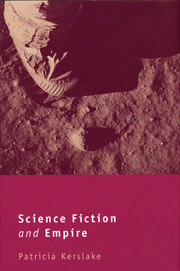Book contents
- Frontmatter
- Contents
- Introduction
- 1 The Self and Representations of the Other in Science Fiction
- 2 Resistance Is Futile: Silencing and Cultural Appropriation
- 3 The Word for World Is Forest: Metaphor and Empire in Science Fiction
- 4 Things Fall Apart: Relativity, Distance and the Periphery
- 5 Moments of Empire: Perceptions of Lasswitz and Wells
- 6 Exoticising the Future: American Greats
- 7 The Shape of Things to Come: Homo futuris and the Imperial Project
- 8 A Postcolonial Imagination: Kim Stanley Robinson's Mars
- 9 Beyond Empire: Meta-empire and Postcoloniality
- Conclusion
- Notes
- Bibliography
- Index
5 - Moments of Empire: Perceptions of Lasswitz and Wells
- Frontmatter
- Contents
- Introduction
- 1 The Self and Representations of the Other in Science Fiction
- 2 Resistance Is Futile: Silencing and Cultural Appropriation
- 3 The Word for World Is Forest: Metaphor and Empire in Science Fiction
- 4 Things Fall Apart: Relativity, Distance and the Periphery
- 5 Moments of Empire: Perceptions of Lasswitz and Wells
- 6 Exoticising the Future: American Greats
- 7 The Shape of Things to Come: Homo futuris and the Imperial Project
- 8 A Postcolonial Imagination: Kim Stanley Robinson's Mars
- 9 Beyond Empire: Meta-empire and Postcoloniality
- Conclusion
- Notes
- Bibliography
- Index
Summary
From the perspective of history, empire is a recorded process. Its fact cannot be removed or altered, but the possible and far-reaching consequences may be sharply examined by moving away from the imperial pathway proper and into the arena of fiction. Countless interstellar conquests have begun from the third planet. Not one of Earth's solar siblings has escaped the fictional grasp of Earth's incessantly expanded centre. Imperialism, it seems, is not a thing of the past: it never left, but moved its narration into SF. As Jane M. Jacobs observes, ‘imperialism may also be reactivated in the present through various nostalgias which seek to memorialise the period of imperial might’, a concept clearly illustrated by the culturally and politically inspired conflicts in Afghanistan and the Balkans during the late twentieth century. Early SF texts were more often about an imminent future rather than the ‘far future’. Although the latter narratives have become more common in recent times, the principles of nostalgia, or a desire to look backwards, are still evident. While authors of SF stand with one foot in tomorrow and one in today, there sometimes seems to be an unwillingness to cut their narratives entirely free from precedent. Even in the supposed avant-garde of fictional texts, the empires of humankind do not step completely away from the historical past. Issues that were of import to both the coloniser and the colonised remain starkly visible in the narratives of the postulated future, where ‘the weight of antiquity continues to dominate cultural production in much of the post-colonial world’.
- Type
- Chapter
- Information
- Science Fiction and Empire , pp. 83 - 104Publisher: Liverpool University PressPrint publication year: 2010



